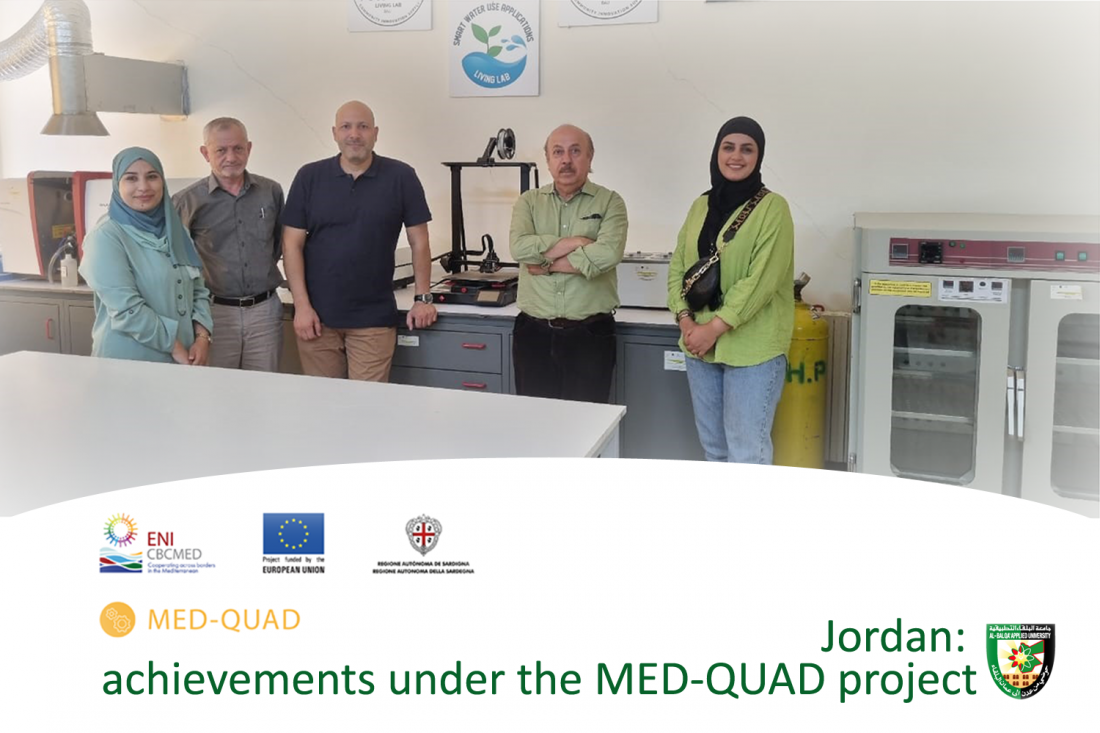MED-QUAD in Jordan fostered collaboration for water conservation and heritage preservation

The MED-QUAD project in Jordan has been instrumental in generating remarkable outcomes across various domains, including heritage preservation, water quality assessment, and community engagement. This collaborative initiative in the Mediterranean, with a particular focus on engaging target groups and stakeholders following the Quadruple Helix Approach, has made significant strides in contributing to the sustainable development and cultural heritage preservation of the region. The Al Balqa Applied University, MED-QUAD partner in Jordan, delves into the essential outcomes of the project and sheds light on its profound impact on Jordan:
- Technical Meetings and Collaborative Engagements
One of the cornerstones of the MED-QUAD project has been its emphasis on facilitating technical meetings and collaborative engagements. Seventeen technical meetings brought together stakeholders and target groups, fostering discussions and cooperation for the development and preservation of heritage sites in Jordan. Additionally, six collaborative meetings were conducted with members of the City Development Groups (CDGs), a consortium of key stakeholders, to discuss the utilization of the SWUAP lab for testing a new gray water quality product. These partnerships included organizations like Yarmouk Water Company, Al-Hassan Industrial City, the Ministry of Tourism and Antiquities, the Jordanian Engineers Union, the University of Jordanian Science and Technology, the Greater Irbid Municipality, and Yarmouk University. Four collaborative meetings also engaged CDG members and local citizens in the analysis of new services in cooperation with university researchers.
- Establishment of Mediterranean Cross-border Living Labs
The MED-QUAD project recognized the importance of research and development facilities for its mission. Thus, the project partners established two "Living Labs" (open spaces for citizen involvement in research) to facilitate cross-border cooperation in each participating country. The first Living Lab is dedicated to "Smart Water Use Applications Living Lab-SWUAP," and the second focuses on "Applied Research for Cultural Heritage Exploitation - ARCHEO Living Lab." These well-equipped laboratories have played a crucial role in various research activities, from laboratory tests to collaborative research with startup companies in the water treatment sector, as well as in boosting cultural heritage. Notably, collaboration with Yarmouk University's Department of Heritage Preservation and Maintenance resulted in the publication of two research papers, contributing valuable insights to the field.
- Training Courses and Community Engagement
The project organized three training seminars aimed at enhancing the role of Civic Universities in community service, fostering engagement and outreach. The first training was the international seminar "Consolidating the Role of the Civic University by Directing Applied Scientific Research to Community Development" on May 23-24, 2022, hosting 95 participants. The second training aimed to equip the City Development Group (CDG) with innovative tools and methods for city planning and research needs, took place from April 30 to May 4, 2023, at Al-Huson University College in Irbid, Jordan, involving 20 participants. The CDG's participation in the third training, implemented from June 4 to 8, 2023, at Al-Balqa Applied University in Irbid, Jordan, provided a valuable opportunity for Jordanian members to learn from experienced urban development experts and share insights with other participants, totaling 28 attendees. These seminars helped bridge the gap between academic institutions and the local community, promoting knowledge sharing and practical skills development, with an emphasis on business executives and university staff. Furthermore, the project actively participated in various events such as Cross-Border meetings, International Seminars, Local Events, workshops etc organized by its partners, promoting a culture of learning and exchange of ideas.
- Research Papers
The MED-QUAD project has been a prolific source of research, with several papers either published or in the process of publication. These research papers cover a wide range of topics, further illustrating the project's commitment to advancing knowledge and improving the well-being of the community and its cultural heritage. Notable research topics include:
- The Effects of Nanoparticles- Zerovalent Iron on Sustainable Biomethane Production through Co-Digestion of Olive Mill Wastewater and Chicken Manure (Authors: Khalideh Al Bkoor Alrawashdeh, Kamel K.A-Zboon, Jalla A.Al-Tabbai, La’ aly A. AL-Sammrraie, Abeer Al Bsoul, Rebhi A.Damseh, Ayat Khasawneh, Yasser Gaber Dessouky, Kareem Tonbol, Bassma M.Ali, Elen E.Youssef)
- Sampling frequency for water consumption in Al-Huson region (Authors: Rebhi A. Damseh, Ayat Khasawneh, Ma’moun Al-Smadi, Petros Samaras, Khalideh Al bkoor Alrawashdeh)
- Risk Management for Jerash Museum (Authors: Wassef Al Sekhaneh, Nawras Shatnawi, Rebhi Damseh, Walaa Otoom, Ayat Khasawneh, Nancy Abdel-Moneim, Yasser Dessouky)
- Geomatics Techniques for Historical Buildings Documentation and Restoration in Northern Jordan (Authors: Nawras Shatnawi, Wassef Al Sekheneh, Rebhi A. Damseh, Walaa Otoom, Ayat Khasawneh, Nancy Abd AlHameed, Yasser Dessouky, Kareem Tonbol)
- Synthesis and Characterization of Metal–Organic Frameworks in the Industrial Wastewater Treatment (Authors: Bassma M. Ali, Zainab Ali, Elen Emad, Ragaa Ahmed, Khalideh Al bkoor, Alrawashdeh, Rebhi A. Damseh, Jalal A. Al-Tabbal, Kamel K. Al-Zboon, Petros Samaras, Kareem Tonbol)
Professor Rebhi A. Damseh, the Local MED-QUAD Project Manager in Jordan, representing Al Balqa Applied University, notes that the project has made a profound impact on Jordan by fostering collaboration, research, and community engagement. With a focus on water quality, heritage preservation, and sustainable development, the project has shown unwavering dedication to the well-being of the community and the preservation of its rich cultural heritage. As the project's achievements continue to evolve and expand, it is expected to create a lasting legacy in the preservation and advancement of Jordan's cultural and environmental assets. The results achieved thus far serve as a testament to the power of collaboration and dedicated efforts in making a positive impact on society.









